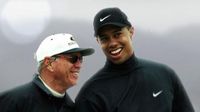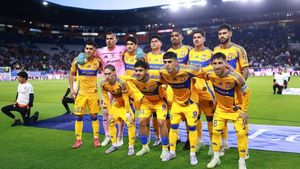Golf has been in Butch Harmon's blood forever, and at the time he needed it most, the game was there to turn his life around, setting him on course to build legends. Harmon, a legendary golf coach known for his work with Tiger Woods, Phil Mickelson, and Dustin Johnson, has been making headlines recently not only for his illustrious career but also for his candid opinions regarding the AimPoint technique that has stirred conversations in the world of golf.
Published on April 11, 2025, the latest discussions surrounding Harmon reveal his insights during an appearance on Sky Sports' broadcast of the Masters at Augusta National. During round two of the prestigious event, Harmon shared his thoughts on AimPoint, a technique that has gained popularity among some of golf's biggest names, including Max Homa and Collin Morikawa.
AimPoint, which focuses on reading greens using a player's feet to assess the slope, has come under fire from critics. Notably, Lucas Glover, who has been vocal about the slow play problem on the PGA Tour, stated, "Statistically, [AimPoint] hasn’t helped anybody make more putts since its inception on the PGA Tour... Statistics have borne that out. It’s also kind of rude to be up near the hole, stomping around figuring out where the break is in your feet. It needs to be banned. It takes forever.”
Harmon echoed Glover's sentiments, expressing skepticism about the effectiveness of AimPoint. "I don’t like it. I know you are the modern type of guy who likes stats; the stats show it doesn’t improve anyone at all. The stats are exactly the same,” he told his colleague Nick Dougherty during the broadcast. This statement reflects a growing concern among some players and analysts about the impact of AimPoint on the pace of play.
However, the debate does not end there. Collin Morikawa, the world No. 4, has publicly disagreed with the criticisms of AimPoint. In February 2025, he stated, "From my perspective, AimPoint has 1,000 percent helped me. I listen to the announcers sometimes during play, and they say why would you AimPoint this, this, and that. It gets a basis of how I read a putt and how I start my lines. It's just like reading something from behind the hole or behind the ball; that's how I'm getting my general read for that."
Morikawa also acknowledged that while AimPoint can lead to slower play if not executed properly, he believes there are issues of respect among players. He suggested that fines could be an effective way to address the slow play problem, stating, "It is an issue on the Tour. You need to start fining people. Look, if I got slapped on the wrist and got a fine like absolutely would I not want to be fined again.”
The contrasting views on AimPoint highlight a significant divide within the golfing community. On one hand, players like Glover and Harmon advocate for the banning of the technique, citing its ineffectiveness and contribution to slow play. On the other hand, players like Morikawa defend AimPoint, emphasizing its benefits in improving their game.
As discussions continue, Harmon hinted at the possibility of changes, stating, "The rules people are talking about it," before quickly adding, “I shouldn’t have said that... I get the feeling with the feet it is the fingers I don’t understand.” This comment suggests that there may be ongoing conversations among PGA Tour officials regarding the future of AimPoint and its role in competitive play.
The Masters, held at Augusta National, is known for its rich history and tradition, and this year's event has been no different. As players navigate the course, the ongoing debate about AimPoint adds an intriguing layer to the competition. With the tournament still underway, fans are eagerly watching to see how the players adapt their strategies and whether any changes to the rules regarding AimPoint will be announced in the future.
In a sport where precision and timing are crucial, the discussions surrounding AimPoint are emblematic of the broader challenges facing professional golf today. The balance between tradition and modernity continues to evolve, and as players like Harmon, Glover, and Morikawa weigh in, the future of techniques like AimPoint remains uncertain.
As the Masters progresses, all eyes will be on how this debate unfolds and whether it will lead to any significant changes in the rules of the game. For now, the excitement of the tournament and the ongoing discussions about AimPoint have captured the attention of golf fans worldwide.





